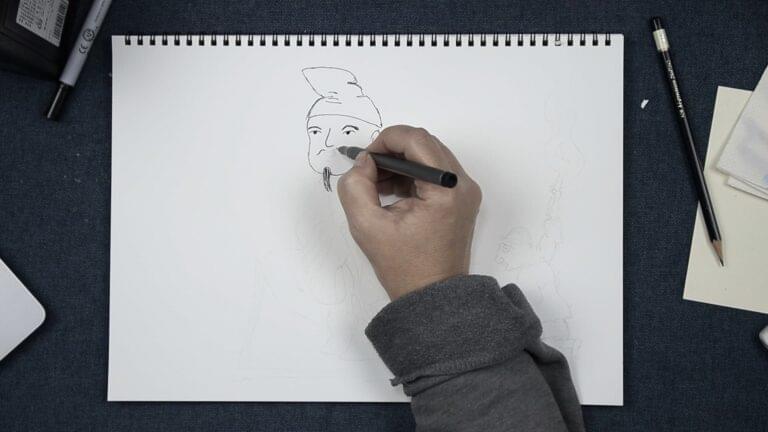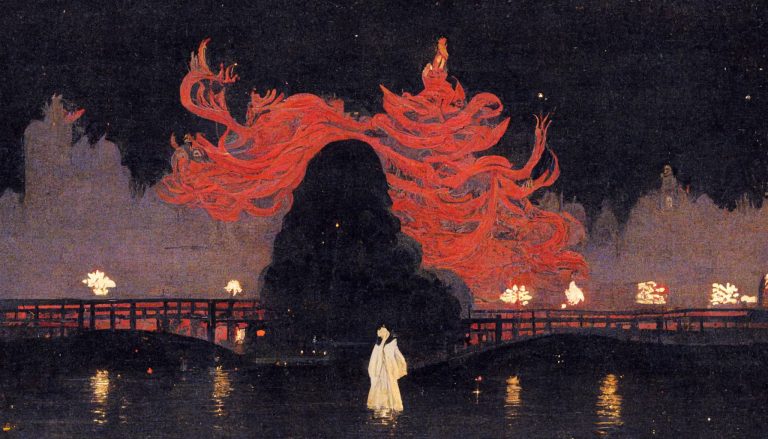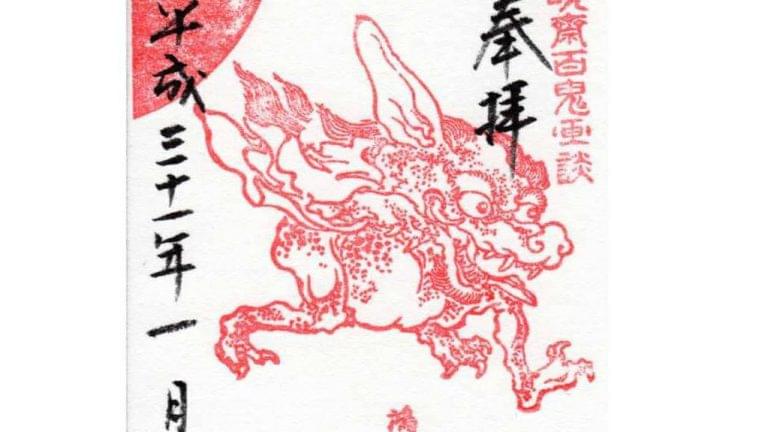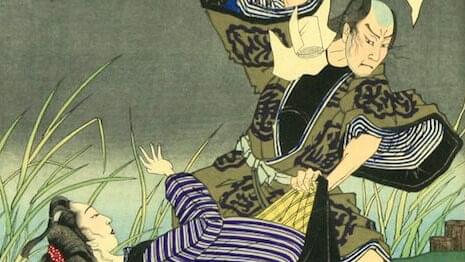This month on Uncanny Japan I talk about ubasuteyama (姥捨山) or Granny Dumping Mountain. Back in old Japan when times were tough and there were too many mouths for one family to feed, they might do something called kuchi herashi (口減らし) or getting rid of mouths. One way to do this was to send one (or more) of your children to live with a wealthier family. Another way to cut down on the number of mouths that needed to be fed was to haul grandma or grandpa up into the mountains and leave them to fend for themselves. Some say it’s just a folktale, others say why of course this happened! What do you think?
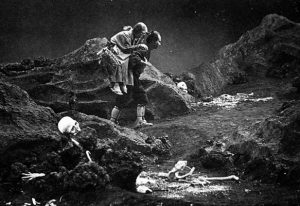
I found a movie in Japanese called Dendera. Its catch copy is: There is a Continuation to ubasuteyama. And the is the poster for it. Brilliant!
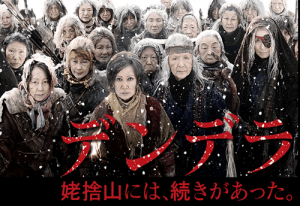
ETA: The station in Nagano is Ubasute-Eki (姨捨駅). I mention in the podcast that the first character for uba is little sister. I was wrong, it’s ‘aunt’. So throwing away aunts. Who I am supposing are older than little sisters.
[00:00:02] Uncanny Japan is author me, Thersa Matsuura, exploring all that is weird from Japan. Strange superstitions and old wives tales, cultural oddities and interesting language quirks. These are little treasures I dig up while doing research for my writing, and I want to share them with you here on Uncanny Japan. I hope you like the show.
[00:00:29] Hey hey everyone, this is Terry and it’s spring in Japan. The cold is pretty much gone here as are the cherry blossoms, and we’ve got night insects again. The rice fields haven’t been planted or flooded yet, so what you hear in the background are pre-frog night bugs.
[00:00:49] Before I start, I want to thank real quick all my patrons. There are 31 of you and you totally make this podcast possible and worth it. This month I was able to graduate from my cruddy headphones to some nice ones that won’t click click click every time I open my mouth. Thank each and every one of you so much. On to this month’s topic.
[00:01:08] Today I’m going to introduce you to a folktale/true story depending on who you talk to. It’s something that I’ve been fascinated with for a long time. So much so that I’ve written two short stories based on it. There’s one in each book, one’s called Taro’s Task and the other one’s called Somewhat Dim. In Japanese the thing is called ubasuteyama (姥捨山), or sometimes oyasuteyama (親捨て山). Uba (姥) means old woman, sute or suteru (捨てる) means to throw something away, and yama (山) is mountain. In the oyasuteyama version oya (親) refers to your parents. So basically it’s the practice of hauling elderly people up a mountain and throwing them away. The original granny dumping, I suppose. Now I’ve seen lots of places that say ubasuteyama tradition is only a folk tale and that it never happened. Actually, it’s usually only the English language sites that do this insisting.
[00:02:05] But the more I read around in Japanese, I find that the consensus is of course this happened, why not. Times were hard and people certainly did a lot worse than this. Let me give you a little more detail in exactly what ubasuteyama is. Quite simply, back in the day when food was scarce and life was rough, there was a custom called kuchi herashi (口減らし). Now this isn’t a folk tale, this really happened. Kuchi herashi literally means getting rid of mouths. One way to do this, and the way that’s most talked about and written about, is to send your child or children to work for another wealthier family, thus giving them a hopefully better life and making it easier to feed your remaining family members. Another way to kuchi herashi was to go the other direction. Don’t get rid of young mouths, but get rid of old ones. Cut down on any infirm, very old, or otherwise troublesome elderly folk that might be hanging around your family or village. There would be a nearby mountain set as the designated place to drop off your old person and it went by the name ubasuteyama or sometimes oyasuteyama. On a certain day someone was chosen to piggy back the unlucky person up the mountain where near the top they’d find a small stone monument, and that’s where they were to leave their passenger. The monument was said to be a grave marker. The carrier returned home, voila, with one less mouth to feed. The people chosen were usually past a certain age, but the ubasuteyama age seemed to be 70. It could have been age or that maybe the chosen person could no longer work enough to earn their keep. There’s a folk tale about ubasuteyama that is very well plotted. I think maybe that’s why I’m so enthralled with this story. It’s just a really good simple tale and it brings up so many questions.
[00:03:56] The reason there is some debate on whether this is real or not is because there aren’t any records and it’s believed that is because granny or grandpa dumpling seems to have been a family thing. It wasn’t something the town or the village promoted, but a choice each family made on its own. Times really were tough, and given some bad weather or a failed crop, and basically everyone starving, I guess sacrifices needed to be made, and it wasn’t something anyone was particularly proud of, so I don’t think they wrote it down. Of course there were folk tales but not so many records, especially not town or village or city records.
[00:04:31] When people talk about ubasuteyama in Japan they usually think of one of two mountains. One is the Kamuriki mountain in Nagano prefecture, and the other is the Kuchibutoyama mountain in Fukushima prefecture. And it’s yes, it’s that Fukushima. With the former, in Nagano, there’s even a train station called Obasute-eki (姨捨駅). Now, the character for oba isn’t obasan (grandma), which I assumed. It’s actually a different character (姨) that I don’t think I’ve ever seen before. It’s a little more difficult and it means little sister. So this is little sister dumping train station, and I don’t know what’s up with that. I’ve been trying to read around, and even the Wikipedia page in Japanese doesn’t have the really good stuff written about it, so I’m going to keep looking and find out what that’s about.
[00:05:18] Another piece of trivia, it’s not a mountain, but some of you might have heard of a place called Aokigahara, the suicide forest. I found some things written about how that forest got its start, being a place for people to take and leave their elderly when they reached a ripe old age. And that over time, that morphed into what it is today, the infamous suicide forest. Now, speaking of suicide, I also found one really convincing article in Japanese about how ubasuteyama wasn’t a family deciding to throw grandma and grandpa away, but that it was the elderly people themselves who are the ones who decided to go. They knew they were a burden on their families, and they insisted that they be taken up and left to die so that there would be more food left for the younger people, right? So it’s more of a suicide mountain. And I find this story really fascinating because to me it’s more Japanese and it’s very self-sacrificing in that the old people are sacrificing themselves to give food and more to the younger people.
[00:06:19] Lastly, there is a book and there are two Japanese movies about ubasuteyama. The movies are titled The Ballad of Narayama in English. That’s Narayama Bushiko in Japanese. The Ballad of Narayama sounds quite lovely, much better than granny dumping mountain or throwing away grandpa mountain, although I think the last two are a lot more intriguing… And a little bit about the movies, the first movie came out in 1958 and it was remade again in 1983. What’s impressive is that the 1983 version has a 7.9 rating on IMDB, and the 1958 version has an 8.0 rating, and that’s pretty darn good for both the original and the remake. Again, it’s a really neat story, it’s really well told and I think it translated well to the screen. I haven’t seen them yet, but that’s what I’m going to do this weekend, I’m going to try to find them both and watch both of them.
[00:07:09] So I will leave you with those two movie recommendations, and if you want to google around I’m sure you can find the story in English somewhere. Like I said, it’s ubasuteyama or oyasuteyama. For my patrons, this month I am going to find the story and re-tell it, or I might read one of my stories. So I’m just trying to decide what to do there.
[00:07:28] But until then, I will let you go and thank you so much for listening. I will talk to you next month. Bye bye.
[00:07:37] Pssst! Hey, do you like scary stories? Or maybe you don’t do full-on horror, but enjoy a nice dark tale. Something creepy involving Japanese folklore and superstition. Well, if that’s the case, you can sneak on over to Amazon or wherever you like to buy books and look for my two short story collections: A Robe of Feathers and The Carp-Faced Boy. All you need to do is search for Theresa Matsuura. Let me spell that for you. T-H-E-R-S-A, M-A-T-S-U-U-R-A. Another place you can find me doing things is on Patreon. There, once a month for my five dollar and up patrons, I translate, retell and record obscure Japanese folktales. Some are dark, some are humorous, some are just weird. And lastly, another super sweet thing you can do is to write a review on iTunes. By doing this you help like minded people find Uncanny Japan. It’s a little thing but it means a lot and it’s a great big help. Thank you, I’m Thersa Matsuura, and I’ll talk to you soon.
(Transcribed using Happy Scribe)
Credits
The intro/outro music of Uncanny Japan is a song by Christiaan Virant (“Yi Gui” from Ting Shuo). The whole album is just gorgeous as it everything else by FM3.

